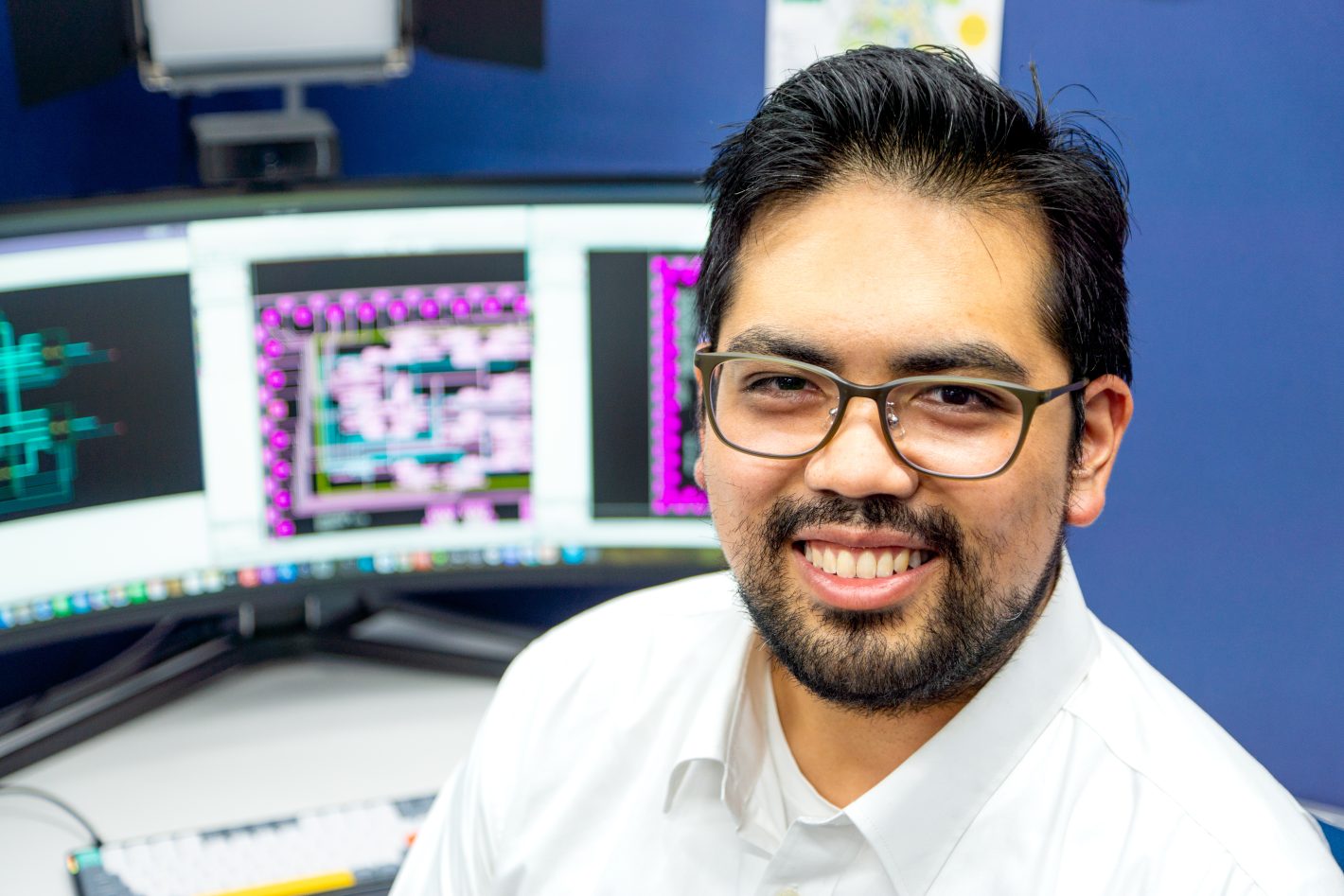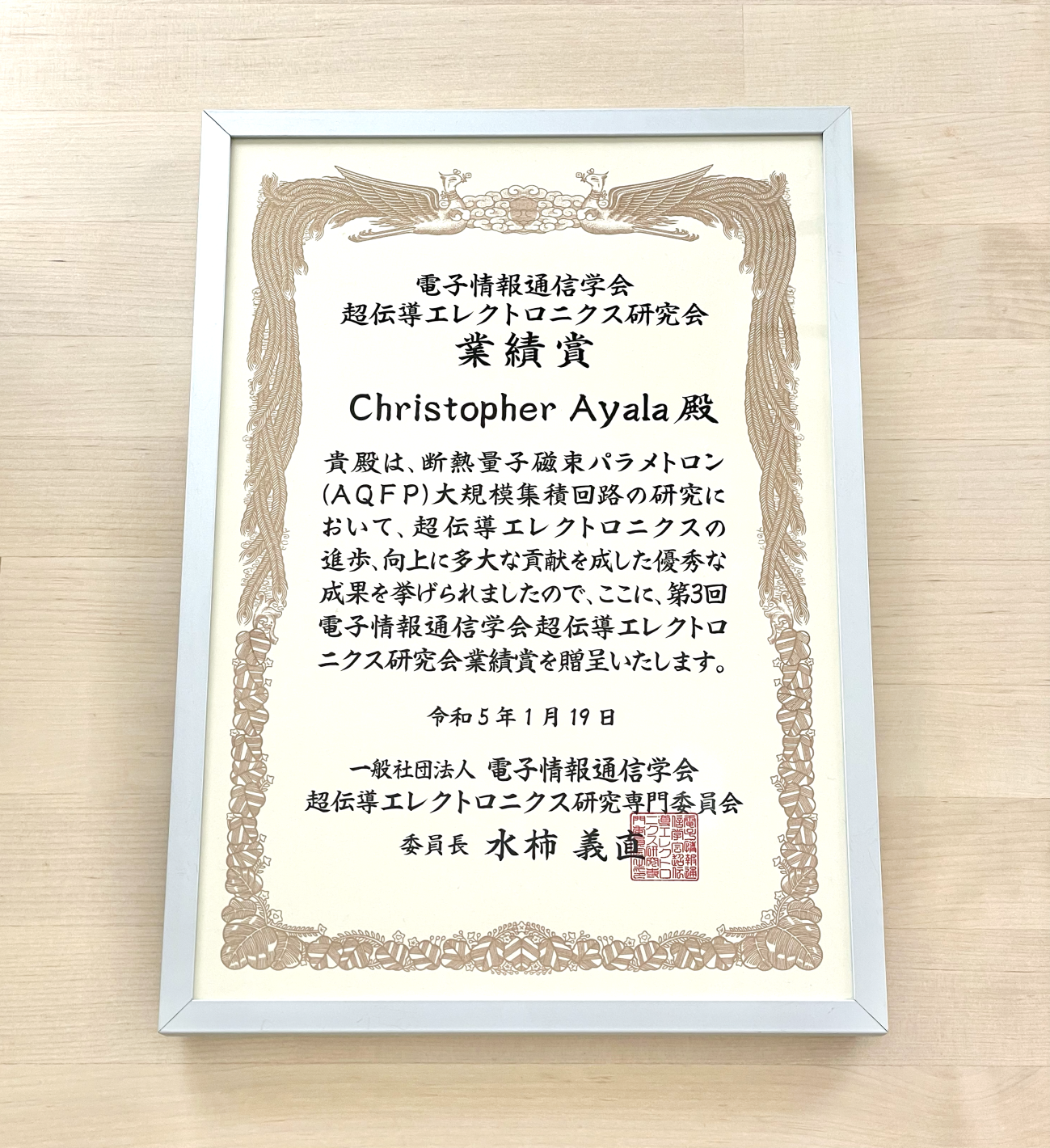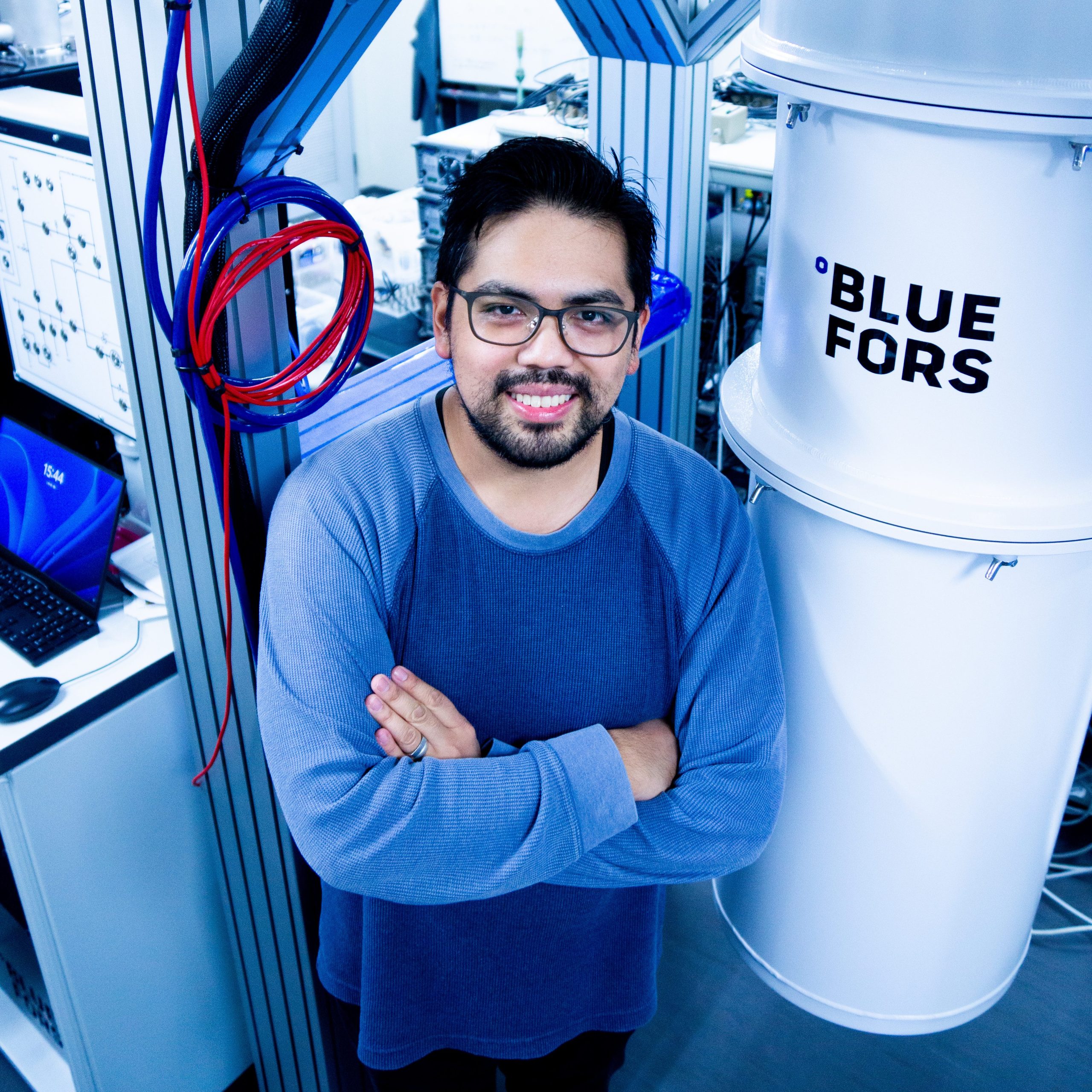Christopher Lawrence Ayala, Assistant Professor, IAS (Quantum Control Electronic Integrated Circuits Laboratory, Quantum Information Research Center)
Researcher Profile
・Name: Christopher Lawrence AYALA
・Institute of Advanced Sciences (IAS) department and title/role: Assistant professor, Quantum Control Electronic Integrated Circuits Laboratory, Quantum Information Research Center
・Main research fields: Superconductor electronics, novel computer architecture, CMOS devices

IAS associate professor Christopher Lawrence Ayala completed his studies in electrical engineering from the bachelor’s to the doctoral level at the State University of New York at Stony Brook, in the state of New York, USA. After obtaining his PhD in 2012, he worked as a postdoctoral researcher at IBM Research Europe–Zurich in Europe for two years, after which he joined the Institute for Advanced Sciences (IAS) at Yokohama National University as an assistant professor in 2015.
During his elementary and junior high school years in the 1990s, Ayala received his very first computer from his father. Despite its low specifications, with a clock speed of less than 100 MHz and memory of less than 32 MB, this computer introduced him to the world of 3D animation and computer-generated imagery (CGI) as a high school student. Subsequently, he developed an interest in 3D hardware such as graphics processing units or GPUs and 3D gaming consoles like the Sony PlayStation, nurturing dreams of participating in product development at Silicon Valley companies like Apple and Sony. Entering graduate school and contemplating how his research could contribute to society, he shifted his focus from product development to cutting-edge technology development, aspiring to make a more direct contribution to consumers and society. The pursuit of new technologies brought him excitement and motivated him to pursue a career in research and development.
Through his research at Yokohama National University, Ayala aims to find efficient solutions for energy consumption in information and communication technology (ICT) based on more energy-efficient computing methods. Simultaneously, he hopes to incorporate new algorithms, designs, and simulation tools from the fields of simulation, computer-aided design and electronic design automation, to contribute to the development of superconducting technology at YNU.
Through his research, Ayala aspires to contribute to creating new computational methods that leverage energy-efficient high-performance computing and technologies such as AI and encryption.
Please describe your current research.
I’m researching superconducting circuit technology based on the Adiabatic Quantum-Flux-Parametron (AQFP). AQFP is utilized as a fundamental element of adiabatic superconducting logic gates in digital electronics such as microprocessors. This technology is gaining attention as one of the most energy-efficient computing technologies, due to its ability to achieve practical computing speeds in the GHz domain while consuming extremely small amounts of energy (1 zJ, or 10-21). I’m conducting research on design methodologies and computer architectures to create practical and feature-rich circuits and systems utilizing AQFP electronics.
In the initial stages, I led a group to develop MANA (Monolithic Adiabatic Integration Architecture), the world’s first adiabatic superconducting microprocessor. This achievement was published in high-level scientific journals and covered by media outlets such as IEEE Spectrum, Superconductor Week magazine, and Nikkei xTECH. Additionally, this accomplishment earned our group the Achievement Award from the Superconducting Electronics Study Group of the Institute of Electronics, Information and Communication Engineers. This was a significant milestone for our group, highlighting new research avenues toward practical applications of AQFP electronics. Currently, our group is addressing these challenges.

What do you think about the research environment and the atmosphere at IAS?
Our research group is a large and diverse assembly with international representation. While closely collaborating with laboratories within IAS (including that of Professor Yuki Yamanashi), we also engage in joint projects with renowned universities and research institutes worldwide, including Germany, France, Switzerland, South Africa, China and the United States. We have a significant presence of foreign professors, researchers, students and visiting scholars throughout the year. This enables easy access to professors, researchers or students working on specific topics, facilitating deeper understanding of those subjects. Moreover, these international connections provide ample opportunities to establish valuable research relationships abroad. For instance, last October, our students participated in a workshop organized by collaborators in South Africa, where they learned about the latest design and simulation tools. Additionally, members of our research group usually present at international conferences two to three times a year, gaining exposure to new research ideas and different cultures.
Our working hours operate on a flextime system, which is important to me. The environment at IAS is flexible, allowing individuals to manage their time freely as long as they meet project deadlines. This flexibility is especially helpful for individuals like me who are raising young daughters.
Finally, at IAS, we can freely propose, discuss or express any topic, from research to personal interests and goals, in a relaxed atmosphere. Here, there’s no shame in asking questions or expressing yourself. I believe this open atmosphere contributes to our group’s strong international influence and ensures that members maintain scientific curiosity.
Out of a perfect score of 100, how would you rate your life so far?
In my self-assessment, I would rate myself at 75 out of 100 points. I’m satisfied with the progress of my research in my life so far and am grateful for the opportunities I’ve been given. It’s also fulfilling to know that through my efforts, I’ve been able to provide a good life for my family. However, a self-assessment of 75 points indicates that there is always room for improvement, reflecting my ambitions and desire for growth. To be honest, continually reaching 100 points may be challenging. This is because today’s 100 points could become tomorrow’s 90 points depending on changes in my perception and goals.
As a child, I would easily become discouraged if I couldn’t achieve something or if I saw others doing better than me. If my childhood self were here today, I would tell him to enjoy his own growth without comparing himself to others. It’s important not to envy others’ success but to enjoy your own progress and growth. And as a light message to my childhood self, I’d like to say, “It may seem unbelievable now, but someday you will live in a country full of the anime and manga you admire.”
What are your future career and life goals?
It’s been almost 10 years since I joined IAS. My term of employment ended this year, so I need to explore opportunities for employment in other departments or schools, domestically or internationally. Transitioning careers as a researcher can be stressful for many, as it involves preparing numerous documents, sometimes even proposals. However, I view this as a natural progression in my career and look forward to embracing new changes.
During the preparation process for switching jobs, I’ve been organizing not only my research areas at IAS but also exploring research directions that interest me personally. I’ve been reflecting on ideas from my time as a postdoctoral researcher at IBM and reevaluating them with the new knowledge I have gained at IAS. My next position is still undecided, but I’m hopeful for the future. I also aim to maintain close collaboration with Professor Nobuyuki Yoshikawa’s group and the network of fellow researchers I have built up over the years.
Furthermore, regardless of what my new position may be, I hope it will help me provide my family with a wonderful life and enriching experiences.

What kind of special experiences have you had in Japan?
Among my numerous memories of life in Japan, the most significant highlight is undoubtedly the wedding ceremony my wife and I had in Minami-uonuma, Niigata Prefecture, which is my wife’s father’s hometown. Our wedding ceremony featured a beautiful fusion of the distinctive atmosphere of the city of Minami-uonuma and a rich international flavor, with many handmade items crafted by us, our families, friends and local businesses. Members of our research group also attended, enjoying a wonderful time while indulging in the local Hakkaisan sake. The wedding garnered attention in the region and was even featured in Zexy, a Japanese wedding magazine. That event marked the beginning of my family life and served as a catalyst for many highlights that followed.
-1-edited-scaled.jpg)
Compared to before coming to Japan, how do you feel you have changed since?
Compared to my former self, I believe I have become a more well-rounded researcher. Through my research experience at IAS, I gained a deeper understanding of various aspects of superconducting circuit technology. Additionally, I accumulated extensive experience in student mentoring. Over the years, I mentored many students, including two doctoral graduates, from the very start. I also gained experience leading projects involving multiple principal investigators from many different countries.
Moreover, with the addition of a family, I have learned to value my time more dearly. I turn down unreasonable schedule demands, to ensure that I can spend time with my wife and children.
Living in Japan can be challenging for foreigners at times, but with the support of Professor Yoshikawa, his group, IAS and my family, I overcame many obstacles. This support has enabled me to grow as a well-rounded researcher and as a person.
A Message to Foreign Researchers Coming to or Considering Joining IAS
Communication is incredibly important. Most problems in research and life in general arise from a lack of communication, where something isn’t properly conveyed, and mutual understanding isn’t established, so I created a shared virtual workspace where all group members can write down key points and action items in real-time. In that workspace, everyone can see what others have written, and any areas of misunderstanding or confusion can be addressed through direct discussions or explanations during face-to-face interactions. Another crucial aspect of communication is not hesitating to ask questions to colleagues or students (and vice versa). Difficult problems are not always solved by a single individual. New perspectives and ideas can be helpful in problem-solving. In summary, open, clear and unbiased communication is key to overcoming challenges in research and life.
Additionally, living in Japan can be challenging for foreigners, and it’s not uncommon to feel powerless or frustrated. At such times, don’t hesitate to seek help from colleagues in the workplace. Experiences in Japan can lead to personal growth, and it’s possible to meet a better version of oneself. Make the most of your time here and strive to build sustainable friendships and cooperative relationships that can continue even after you leave Japan.

